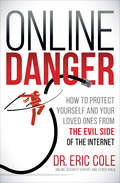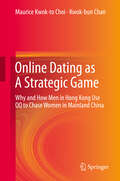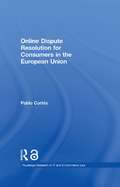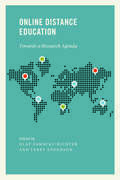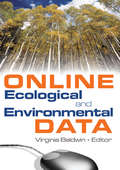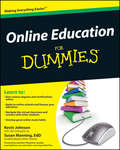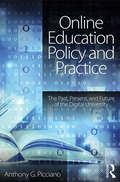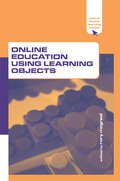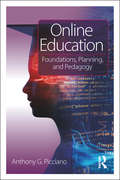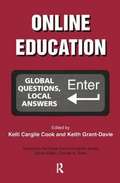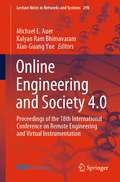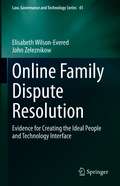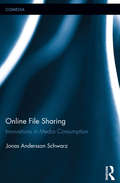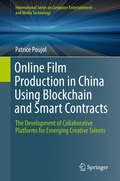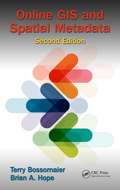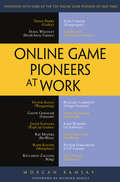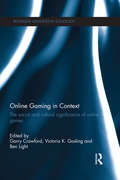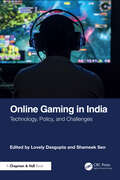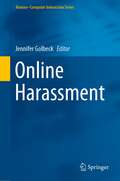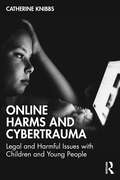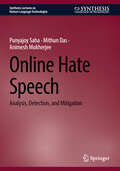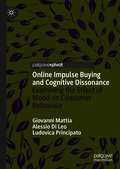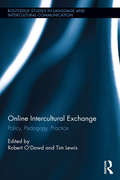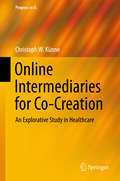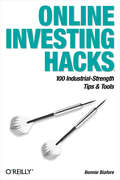- Table View
- List View
Online Danger: How to Protect Yourself and Your Loved Ones from the Evil Side of the Internet
by Dr. Eric ColeA cybersecurity expert offers helpful tips and easy-to-follow instructions on how to keep you, your family, and your business safer online. The Internet is an informative, fun, and educational resource for the entire family, but it also has its own risks and dangers. From phishing to cyberbullying to identity theft, there are myriad ways you could be harmed online, often with irreparable damage. Fortunately, there are precautions everyone can take to protect themselves, their families, and their businesses—and they don&’t require technical expertise. In this book, cybersecurity expert Dr. Eric Cole, provides a layman&’s look at how to protect yourself online. Whether you&’re a parent wanting to keep your children safe online; a senior citizen who doesn&’t want to fall prey to the latest scam; a doctor, lawyer, or teacher who is responsible for safeguarding sensitive data; or simply a technology user who wants to protect themselves in cyberspace, Cole explains in plain language the many steps you can take to make your computer safer, protect your email, guard your online accounts, and more.
Online Dating as A Strategic Game
by Maurice Kwok-to Choi Kwok-Bun ChanBased on a study using online ethnography as the major research method, this book explains why and how men in Hong Kong use QQ--an online instant messenger--to "chase" women in mainland China, especially in the neighboring city of Shenzhen. Chasing women through QQ is a reciprocal exchange process during which the resources to be exchanged in the interaction are not negotiated. Rather, the men provide resources to the women, hoping for rewards in return that are not guaranteed. This characteristic of the exchange makes men who chase women through QQ very strategic in their action. They try to maximize the rewards and minimize the costs by adopting myriad strategies, such as constructing an attractive online identity by strategic self-presentation. The role of emotions in the exchange process is also examined. Men learn the emotional norms through the online forum, but sometimes it is difficult for them to control their emotions; some men fall in love when they are not supposed to. As it happens, they have failed to calculate the costs and rewards rationally in that they may provide too many resources to the women without getting enough rewards in return. This book provides original insights into the thought processes, motivations, desires, anxieties and risks of Hong Kong men seeking short-term sexual relations with women on the mainland. These insights are highly relevant to our understanding of the quickly evolving use of social media, a phenomenon of worldwide importance and deep implications.
Online Dispute Resolution for Consumers in the European Union (Routledge Research in Information Technology and E-Commerce Law)
by Pablo CortésA PDF version of this book is available for free in open access via www.tandfebooks.com as well as the OAPEN Library platform, www.oapen.org. It has been made available under a Creative Commons Attribution-Non Commercial-No Derivatives 3.0 license and is part of the OAPEN-UK research project. E-commerce offers immense challenges to traditional dispute resolution methods, as it entails parties often located in different parts of the world making contracts with each other at the click of a mouse. The use of traditional litigation for disputes arising in this forum is often inconvenient, impractical, time-consuming and expensive due to the low value of the transactions and the physical distance between the parties. Thus modern legal systems face a crucial choice: either to adopt traditional dispute resolution methods that have served the legal systems well for hundreds of years or to find new methods which are better suited to a world not anchored in territorial borders. Online Dispute Resolution (ODR), originally an off-shoot of Alternative Dispute Resolution (ADR), takes advantage of the speed and convenience of the Internet, becoming the best, and often the only option for enhancing consumer redress and strengthening their trust in e-commerce. This book provides an in-depth account of the potential of ODR for European consumers, offering a comprehensive and up to date analysis of the development of ODR. It considers the current expansion of ODR and evaluates the challenges posed in its growth. The book proposes the creation of legal standards to close the gap between the potential of ODR services and their actual use, arguing that ODR, if it is to realise its full potential in the resolution of e-commerce disputes and in the enforcement of consumer rights, must be grounded firmly on a European regulatory model.
Online Distance Education: Towards a Research Agenda
by Terry Anderson Olaf Zawacki-RichterOnline Distance Education: Towards a Research Agenda provides a systematic overview of the major issues, trends, and areas of priority in online distance education research. In each chapter an international expert or team of experts provides an overview of one relevant issue in online distance education, discussing theoretical insights that guide the research, summarizing major research on the topic, posing questions and directions for future research, and discussing the implications for distance education practice as a whole. Intended as a primary reference and guide for distance educators, researchers, and policymakers, Online Distance Education takes care to address aspects of distance education practice that until now have often been marginalized, including issues of cost and economics, social justice implications, cultural impacts, faculty professional development, and the management and growth of learner communities. At once soundly empirical and thoughtfully reflective, yet also forward-looking and open to new approaches to online and distance teaching, this text is a solid resource for researchers in a rapidly expanding discipline.
Online Ecological and Environmental Data
by Virginia Ann BaldwinDiscover important Internet resources for research data made public individually and collectively by researchers from a variety of entities in the fields of environmental studies and ecology Online Ecological and Environmental Data explores innovative projects from a diverse array of institutions that have made environmental and ecological research information freely available online. You will find a wealth of Web site listings with URLs and complete descriptions, data field descriptions, controlled vocabulary examples, and Web screen shots that demonstrate how to use a specific site. The book will help you locate the data, procedures, instruments, notes, and other descriptive information that scientists and engineers need for replicating and building on the research of others. With Online Ecological and Environmental Data, you'll gain a better understanding of: * the cooperative design, development, and management of interdisciplinary data * cataloging multidisciplinary environmental data * data networking * new developments in information science and technology * extracting and compiling data * the convergence and dissemination of information via the Internet This unique resource explores the potential of distributing actual research data on the Web. The information you'll find in this book will enable science and technology librarians to provide effective access to library patrons. Online Ecological and Environmental Data will give librarians and other information specialists-as well as faculty and students in library sciences and technology-cutting-edge knowledge to meet the global data and information needs of the scientific community. The projects described in this book can serve as models for other disciplines, especially for the various aspects of handling data made available online, and for making this data more available and usable on the Internet for researchers and students.
Online Education For Dummies
by Susan Manning Kevin E. Johnson Jonathan E. FinkelsteinFrom admission to graduation-your personal guide to studying onlineOnline Education For Dummies explains the ins and outs of attending a virtual classroom, and provides you with the tools you need to hone your skills or obtain additional certification and degrees. This practical reference not only helps you get the most out of an online course, but also offers a wealth of advice to help you pick the one that matches your interests and needs.Identifies the software and hardware needed to study onlineReveals how to get financial aid, transfer credits, and manage online timeExplains how to locate legitimate online programs and avoid scamsWhether you want to earn a degree or just increase your knowledge through an online course, Online Education For Dummies is the only guide you need.
Online Education Policy and Practice: The Past, Present, and Future of the Digital University
by Anthony G. PiccianoOnline Education Policy and Practice examines the past, present, and future of networked learning environments and the changing role of faculty within them. As digital technologies in higher education increasingly enable blended classrooms, collaborative assignments, and wider student access, an understanding of the creation and ongoing developments of these platforms is needed more than ever. By investigating the history of online education, the rise and critique of MOOCs, the mainstreaming of social media, mobile devices, gaming in instruction, and more, this expansive book outlines a variety of potential scenarios likely to become realities in higher education over the next decade.
Online Education Using Learning Objects (Open and Flexible Learning Series)
by Rory McGreal'E-learning is integral to on-site education institutions worldwide, and the rapid explosion of interest in the subject means that this timely, cutting-edge book will be an instant and indispensable resource. Among educators, the development of reusable learning objects made accessible via the internet is ever more important to teaching and learning. This book provides a comprehensive look at a state-of-the-art online education, and presents advice on the creation, adaptation and implementation of learning objects and metadata. Including articles written by some of the leading innovators in the field, this book takes the reader through: designing effective learning objects; creating learning objects; transforming existing content into reusable learning objects; building a metadata management system. This book will be essential reference material for learning technologists, course developers at learning institutions, postgraduate students, teachers and learners in the field of e-learning.'
Online Education: Foundations, Planning, and Pedagogy
by Anthony G. Picciano<i>Online Education</i> is a comprehensive exploration of blended and fully online teaching platforms, addressing history, theory, research, planning, and practice. As colleges, universities, and schools around the world adopt large-scale technologies and traditional class models shift into seamless, digitally interactive environments, critical insights are needed into the implications for administration and pedagogy. Written by a major contributor to the field, this book contextualizes online education in the past and present before analyzing its fundamental changes to instruction, program integration, social interaction, content construction, networked media, policy, and more. A provocative concluding chapter speculates on the future of education as the sector becomes increasingly dependent on learning technologies.
Online Education: Global Questions, Local Answers
by Kelli Cargile Cook Keith Grant-Davie24 college educators focus on the most important questions to be addressed by all scholar-teachers and administrators committed to developing high-quality online education programs. The educators describe these questions as "global" because they transcend the particular situations of individual institutions. They are questions that everyone in online education needs to address: What are the issues to consider when first developing and then sustaining an online education program? How do we create interactive, pedagogically sound online courses and classroom communities? How should we monitor and assess the quality of online courses and programs? How should recent developments and innovations in online education cause us to reexamine our roles and responsibilities as educators in technical communication? While these questions affect all of us, they demand different local answers, such as those presented by the contributors to this textbook.
Online Engineering and Society 4.0: Proceedings of the 18th International Conference on Remote Engineering and Virtual Instrumentation (Lecture Notes in Networks and Systems #298)
by Michael E. Auer Kalyan Ram Bhimavaram Xiao-Guang YueThis book presents the general objective of the REV2021 conference which is to contribute and discuss fundamentals, applications, and experiences in the field of Online and Remote Engineering, Virtual Instrumentation, and other related new technologies like Cross Reality, Data Science & Big Data, Internet of Things & Industrial Internet of Things, Industry 4.0, Cyber Security, and M2M & Smart Objects. Nowadays, online technologies are the core of most fields of engineering and the whole society and are inseparably connected, for example, with Internet of Things, Industry 4.0 & Industrial Internet of Things, Cloud Technologies, Data Science, Cross & Mixed Reality, Remote Working Environments, Online & Biomedical Engineering, to name only a few.Since the first REV conference in 2004, we tried to focus on the upcoming use of the Internet for engineering tasks and the opportunities as well as challenges around it. In a globally connected world, the interest in online collaboration, teleworking, remote services, and other digital working environments is rapidly increasing. Another objective of the conference is to discuss guidelines and new concepts for engineering education in higher and vocational education institutions, including emerging technologies in learning, MOOCs & MOOLs, and Open Resources.REV2021 on "Online Engineering and Society 4.0" was the 17th in a series of annual events concerning the area of Remote Engineering and Virtual Instrumentation. It has been organized in cooperation with the International Engineering and Technology Institute (IETI) as an online event from February 24 to 26, 2021.
Online Family Dispute Resolution: Evidence for Creating the Ideal People and Technology Interface (Law, Governance and Technology Series #45)
by John Zeleznikow Elisabeth Wilson-EveredThis book brings together the expertise of two authors involved in initiating the development of Online Family Dispute Resolution (OFDR), while also examining the unique Australian system. The family arena generally comprises property or child-related disputes arising between parents, whether married or not, and whether the parties have lived together or not. A special feature of Australia’s OFDR system is that it deals with children’s issues rather than focusing on property distribution. The book first discusses how technological innovations have transformed dispute resolution services to families. It explores the need for OFDR and how such systems can potentially be implemented. In turn, the coverage shifts to screening tools used prior to a Family Dispute Resolution session to ensure that online systems are appropriate for the case under dispute and the people involved. Readers will then learn about the necessary training required – for administrators, practitioners and clients alike - for OFDR to be successful. In addition, the book offers a comprehensive evaluation of the system and reflects on the lessons learned to date. In closing, it suggests ways in which OFDR could be further developed and applied to family disputes around the world.
Online File Sharing: Innovations in Media Consumption (Comedia)
by Jonas Andersson SchwarzIt is apparent that file sharing on the Internet has become an emerging norm of media consumption—especially among young people. This book provides a critical perspective on this phenomenon, exploring issues related to file sharing, downloading, peer-to-peer networks, "piracy," and (not least) policy issues regarding these practices. Andersson Schwartz critically engages with the justificatory discourses of the actual file-sharers, taking Sweden as a geographic focus. By focusing on the example of Sweden—home to both The Pirate Bay and Spotify—he provides a unique insight into a mentality that drives both innovation and deviance and accommodates sharing in both its unadulterated and its compliant, business-friendly forms.
Online Film Production in China Using Blockchain and Smart Contracts: The Development of Collaborative Platforms for Emerging Creative Talents (International Series on Computer Entertainment and Media Technology)
by Patrice PoujolThis book explores the use of Blockchain and smart contract technologies to develop new ways to finance independent films and digital media worldwide. Using case studies of Alibaba and in-depth, on-set observation of a Sino-US coproduction, as well as research collected from urban China, Hong Kong, Europe, and the USA, Online Film Production in China Using Blockchain and Smart Contracts explores new digital platforms and what this means for the international production of creative works. This research assesses the change in media consciousness from young urban audiences, their emergence as a potential participative and creative community within dis-intermediated, decentralised and distributed crowdfunding and crowdsourcing models. This research proposes solutions on how these young emerging local creative talents can be identified and nurtured early on, particularly those who now produce creative and artistic audiovisual content whether these works are related to film, Virtual Reality (VR), video game, graphic novels, or music. Ultimately, a new media content finance and production platform implementing blockchain is proposed to bring transparency in the film sector and open doors to emerging artists in digital media. Appropriate for both professionals and academics in the film industry as well as computer science.
Online GIS and Spatial Metadata
by Terry Bossomaier Brian A. HopeImplement Your Own Applications Using Online GISAn in-depth study detailing the online applications of geographic information systems (GIS), Online GIS and Spatial Metadata, Second Edition outlines how GIS data are published, organized, accessed, searched, maintained, purchased, and processed over the web. This latest work describes how the interne
Online Game Pioneers at Work
by Morgan RamsayIn this groundbreaking collection of 15 interviews, successful founders of entertainment software companies reflect on their challenges and how they survived. You will learn of the strategies, the sacrifices, the long hours, the commitment, and the dedication to quality that led to their successes but also of the toll that this incredibly competitive market has on even its most brilliant minds. For the hundreds of thousands of game developers out there, this is a must read survival guide. For those who simply enjoy games and know of some of these founders, this will be a most interesting read. Sales of video games, hardware, and accessories reach upwards of $20 billion every year in the United States alone, and more than two-thirds of American households include video games in their daily lives. In a world that seems to be overflowing with fortune and success, the vicious truth of this booming industry is easily forgotten: failure is tradition. Video games define a cultural crossroad where business, entertainment, and technology converge, where the risks are great, cutting edge technology is vitally important and competition is intense. Here are the stories of survival from many of the industries luminaries who founded companies, created industries in their home countries, took amazing risks, innovated technologies, and invented new ways to sell. Among this outstanding group of pioneers are Richard Garriott, founder of Origin, astronaut, and the producer of the revolutionary Ultima Online, John Romero of Doom, Wolfenstein and Quake fame, and Victor Kislyi whose World of Tanks set the Guinness world record for the most people online at once with over 1. 1 million people playing). You will read their stories and you will gain an understanding of how they managed in such a demanding business. There are a few game development companies that have withstood the test of time; most startups exit as quickly as they enter the scene. Many firms are outpaced by the explosive worldwide growth and economic realities of the sector. Here are enlightening the stories of entrepreneurs who found success and many who subsequently could not repeat it. They walk you through their incredible journeys of success and failure while expressing their views on development, design, hiring, finance, business models, selling their organization, the business life cycle, their frustrations and mistakes, while showing their intensity and their passion for the business along the way. Online Game Pioneers at Work: Explores the formation of entertainment software companies from the perspectives of successful founders who defied the odds Provides insight into why experienced professionals sacrifice the comfort of gainful employment for the uncertainty and risk of the startup Shares the experiences and lessons that shape the lives, decisions, and struggles of entrepreneurs in this volatile business Other books in the Apress At Work Series: Gamers at Work, Ramsay. 978-1-4302-3351-0 Coders at Work, Seibel, 978-1-4302-1948-4 Venture Capitalists at Work, Shah & Shah, 978-1-4302-3837-9 CIOs at Work, Yourdon, 978-1-4302-3554-5 CTOs at Work, Donaldson, Seigel, & Donaldson, 978-1-4302-3593-4 Founders at Work, Livingston, 978-1-4302-1078-8 European Founders at Work, Santos, 978-1-4302-3906-2 Women Leaders at Work, Ghaffari, 978-1-4302-3729-7 Advertisers at Work, Tuten, 978-1-4302-3828-7 What you''ll learn That the commitment to quality was the key to success for all of these entrepreneurs That riding the cutting edge of the technology was an enormous advantage That knowingly compromising principles often led to disastrous results Making a deal with the devil is a losing strategy Seeing change and reacting to it with a first quality product is a winning formula Truly understanding your customers through whatever means possible is a key to success To learn from mistakes and make informed course corrections To enter with style and exit with grace Who this book is for Software game professionals or managers Game developers interested in starti...
Online Gaming in Context: The social and cultural significance of online games (Routledge Advances in Sociology)
by Garry Crawford Ben Light Victoria K. GoslingThere is little question of the social, cultural and economic importance of video games in the world today, with gaming now rivalling the movie and music sectors as a major leisure industry and pastime. The significance of video games within our everyday lives has certainly been increased and shaped by new technologies and gaming patterns, including the rise of home-based games consoles, advances in mobile telephone technology, the rise in more 'sociable' forms of gaming, and of course the advent of the Internet. This book explores the opportunities, challenges and patterns of gameplay and sociality afforded by the Internet and online gaming. Bringing together a series of original essays from both leading and emerging academics in the field of game studies, many of which employ new empirical work and innovative theoretical approaches to gaming, this book considers key issues crucial to our understanding of online gaming and associated social relations, including: patterns of play, legal and copyright issues, player production, identity construction, gamer communities, communication, patterns of social exclusion and inclusion around religion, gender and disability, and future directions in online gaming.
Online Gaming in India: Technology, Policy, and Challenges
by Lovely Dasgupta Shameek SenThis book offers a comprehensive overview from diverse perspectives of online gaming technology, policy, and experiments to understand and review the Indian approach. It starts with the technological viewpoint on the governance and regulation of online gaming and includes the Indian experiment in governing and regulating it. The book brings a nuanced approach related to the perspectives of various stakeholders, the players, the developers, the gamers, the regulators, the law enforcement agencies, the industry and most importantly, the consumers, who are also the intended audience of the work. Present a holistic view of the online gaming industry from technical, legal and policymaking perspectives Offers critical technical highlights include Online transactions, online games ecosystem, online games varied platforms, web3, metaverse, AI and Fantasy Games Includes a comparative analysis to evaluate better the laws, rules, and regulations and the governance of online gaming in India Encapsulates the Indian experience in intervening and streamlining the online gaming industry The book is for Professionals and scholars in the fields of Online Gaming in computer science, Law, and other related discipline. It also serves as a textbook for students for Online Gaming courses.
Online Harassment (Human–Computer Interaction Series)
by Jennifer GolbeckOnline Harassment is one of the most serious problems in social media. To address it requires understanding the forms harassment takes, how it impacts the targets, who harasses, and how technology that stands between users and social media can stop harassers and protect users. The field of Human-Computer Interaction provides a unique set of tools to address this challenge. This book brings together experts in theory, socio-technical systems, network analysis, text analysis, and machine learning to present a broad set of analyses and applications that improve our understanding of the harassment problem and how to address it. This book tackles the problem of harassment by addressing it in three major domains. First, chapters explore how harassment manifests, including extensive analysis of the Gamer Gate incident, stylistic features of different types of harassment, how gender differences affect misogynistic harassment. Then, we look at the results of harassment, including how it drives people offline and the impacts it has on targets. Finally, we address techniques for mitigating harassment, both through automated detection and filtering and interface options that users control. Together, many branches of HCI come together to provide a comprehensive look at the phenomenon of online harassment and to advance the field toward effective human-oriented solutions.
Online Harms and Cybertrauma: Legal and Harmful Issues with Children and Young People
by Catherine KnibbsThis vital, sensitive guide explains the serious issues children face online and how they are impacted by them on a developmental, neurological, social, mental health and wellbeing level. Covering technologies used by children aged two through to adulthood, it offers parents and professionals clear, evidence-based information about online harms and their effects and what they can do to support their child should they see, hear or bear witness to these events online. Catherine Knibbs, specialist advisor in the field, explains the issues involved when using online platforms and devices in family, social and educational settings. Examined in as non-traumatising a way as possible, the book covers key topics including cyberbullying; cyberstalking; pornography; online grooming; sexting; live streaming; vigilantism; suicide and self-harm; trolling and e-harassment; bantz, doxing and social media hacking; dares, trends and life-threatening activities; information and misinformation; and psychological games. It also explores the complex overlap of offline and online worlds in children and young people’s lives. Offering guidance and proactive and reactive strategies based in neuroscience and child development, it reveals how e-safety is not one size fits all and must consider individual children’s and families’ vulnerabilities. Online Harms and Cybertrauma will equip professionals and parents with the knowledge to support their work and direct conversations about the online harms that children and young people face. It is essential reading for those training and working with children in psychological, educational and social work contexts, as well as parents, policy makers and those involved in development of online technologies.
Online Hate Speech: Analysis, Detection, and Mitigation (Synthesis Lectures on Human Language Technologies)
by Animesh Mukherjee Punyajoy Saha Mithun DasThis book informs readers on how to understand, detect, and mitigate hate speech in online social media. The authors first cover the definition of hate speech and how its prevalence can be measured on online social media platforms using text and graph-based methods. The book then describes the process of detecting hate speech and presents a comprehensive account of the AI models that are currently being used. Further, the authors discuss the associated challenges that must be overcome while using these models. The book concludes with an overview of the mitigation techniques for hate speech, including blocking or suspension of the accounts (hard technique) and counterspeech (soft technique), and a discussion of the effects of these techniques on social media platforms.
Online Impulse Buying and Cognitive Dissonance: Examining the Effect of Mood on Consumer Behaviour
by Ludovica Principato Giovanni Mattia Alessio Di LeoConsumers’ beliefs and attitudes towards online sales significantly influence buying behavior on the internet. However, the impact of these thoughts and beliefs on the decision to make an online purchase is not direct. It can be moderated by the emotions experienced while browsing an e-commerce website. Impulse buying in particular is influenced by a number of factors, for example how stimulating the e-shopping platform is, and how easy it is to click on the cart a certain product, for instance a smartphone. But what happens after an online impulse buy is made? Often the customer can regret the purchase and in the throes of anxiety, look for reasons to justify the choices made. Consumer behaviour scholars and pyschologists call this phenomenon cognitive dissonance, and certain individuals are more sensitive than others in developing this than others.This book offers a deep investigation around online impulse buying and subsequent cognitive dissonance. Specifically, the authors present a research case study of a group of millenials who are shopping for smartphones to study whether an initial positive state can reduce the onset of cognitive dissonance in consumers. Based on substantial research and a sample of 212 impulsive millennial buyers, the book provides a comprehensive, but simple and synthetic framework of impulse buying, cognitive dissonance and positive affect state, highlighting their relationships.
Online Intercultural Exchange: Policy, Pedagogy, Practice (Routledge Studies in Language and Intercultural Communication #15)
by Tim Lewis Robert O'DowdThis volume provides a state of the art overview of Online Intercultural Exchange (OIE) in university education and demonstrates how educators can use OIE to address current challenges in university contexts such as internationalisation, virtual mobility and intercultural foreign language education. Since the 1990s, educators have been using virtual interaction to bring their classes into contact with geographically distant partner classes to create opportunities for authentic communication, meaningful collaboration and first-hand experience of working and learning with partners from other cultural backgrounds. Online exchange projects of this nature can contribute to the development of learner autonomy, linguistic accuracy, intercultural awareness, intercultural skills and electronic literacies. Online Intercultural Exchange has now reached a stage where it is moving beyond individual classroom initiatives and is assuming a role as a major tool for internationalization, intercultural development and virtual mobility in universities around the globe. This volume reports qualitative and quantitative findings on the impact of OIE on universities in Europe and elsewhere and offers comprehensive guidance on using OIE at both pedagogical and technological levels. It provides theoretically-informed accounts of Online Intercultural Exchanges which will relevant to researchers in Computer Assisted Language Learning, Computer-Mediated Communication, or Virtual Education. Finally, contributors offer a collection of practitioner-authored and practically-oriented case studies for the benefit of teachers of foreign languages or in other subject areas who wish to engage in developing the digital literacy and intercultural competences of their learners.
Online Intermediaries for Co-Creation
by Christoph W. KünneThis book investigates the powerful role of online intermediaries, which connect companies with their end customers, to facilitate joint product innovation. Especially in the healthcare context, such intermediaries deploy interactive online platforms to foster co-creation between engaged healthcare consumers and innovation-seeking healthcare companies. In three empirical studies, this book outlines the key characteristics of online intermediaries in healthcare, their distinct strategies, and the remaining challenges in the field. Readers will also be introduced to the stages companies go through in adopting such co-created solutions. As such, the work appeals for both its academic scope and practical reach.
Online Investing Hacks: 100 Industrial-Strength Tips & Tools
by Bonnie BiaforeFor the geek who's an investor, and the investor who's a geek, we present Online Investing Hacks, 100 industrial-strength, bleeding edge tips, tools and techniques for analyzing and managing online portfolios.Individual investors have become more computer-literate and technology-dependent than ever before. Whether you're looking for suitable investments, studying alternatives, or managing your portfolios, you need data. The Internet can be a goldmine of financial data and research, but today's online investors also use spreadsheets, databases, and financial applications to select, study and manage investments. If your proficiency has grown to the point where you crave industrial-strength tips and tools to turbo-charge your efforts, this is the book for you.Online Investing Hacks covers:Screening InvestmentsCollecting DataFundamental AnalysisTechnical AnalysisExecuting TradesInvesting in Mutual FundsPortfolio ManagementUpdating Stock DataFinancial PlanningOther books for managing online investing are either out of date, are for beginners and don't go beyond the most basic advice, or are so dull and boring they squeeze that last bit of fun out of the topic. Online Investing Hacks is for the customer who wants to know the latest techniques, to go beyond the basics, who gets jazzed by cool online tools and services, and who actually wants to have a bit of fun while trying to strike it rich (or at least not lose their shirt).
